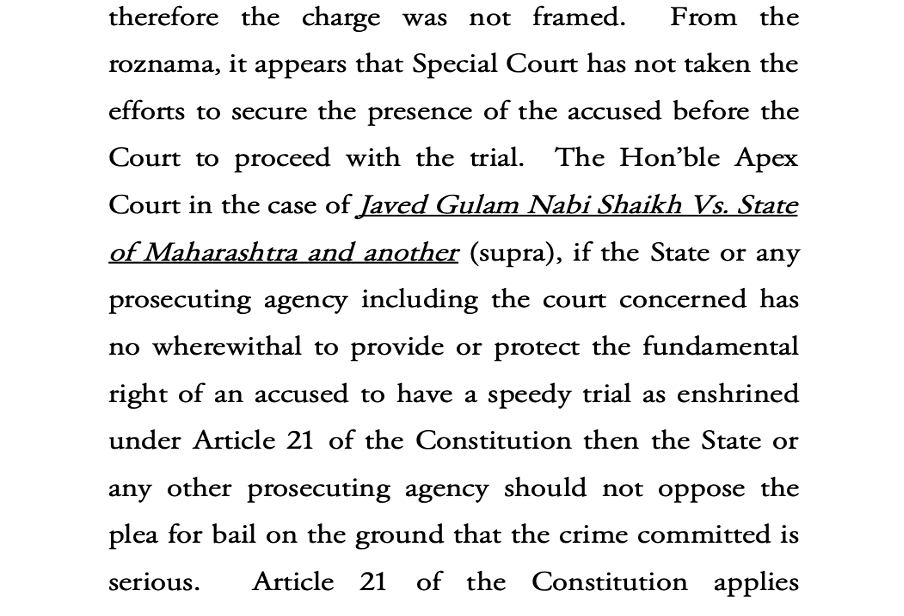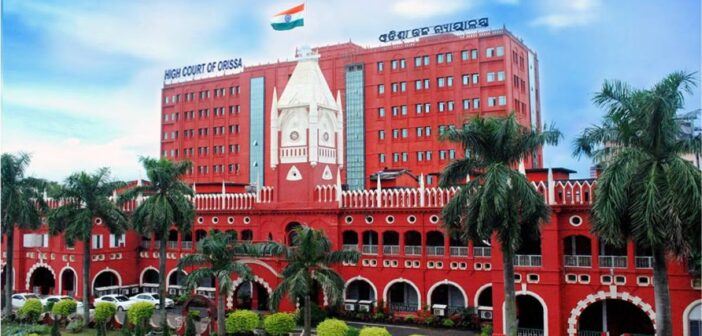In this edition of Court Judgements, we look at Delhi HC’s order that permitted the transfer of mortal remains of Indian-origin U.K Citizen to India for burial while critiquing inconsistency in rules among Indian embassies in different nations, Odisha HC’s order that Voter ID does not serve as the conclusive proof of Date of Birth, J&K HC’s order that Children’s Courts are competent to try offences under UAPA, among others.
Delhi HC: Permits transfer of mortal remains of Indian-origin UK citizen to India for burial; critiques inconsistency in rules among Indian embassies in different nations
In the case of Anthony Watts vs. Union of India (UOI) & Anr, the Delhi High Court (HC) permitted the transfer of mortal remains of an Indian-origin United Kingdom (U.K) citizen who died in the U.K.
The facts of the case were that Mr Watts was born in 1988 in the city of Hyderabad, India. To this effect, he also procured an Indian Passport. Subsequently, he obtained UK citizenship and passed away in July 2024. During his lifetime, he expressed his desire to place his mortal remains next to the burial place of his grandparents in Hyderabad. After his demise, though the UK authorities permitted the transfer of mortal remains, the Indian embassy rejected the request citing a lack of a No-objection certificate (NOC) from the Indian High Commission in London. The NOC was rejected on the reason that Mr. Watts at the time of his death was a British citizen, and he did not obtain an Overseas Citizen of India (OCI) Card.
The petitioner argued that the Indian embassies situated in places like Singapore, and Washington D.C. do not have specific rules which require the obtainment of NOC for transfer of mortal remains. Instead, the requirement in both countries is clearance from the local authorities and valid documents demonstrating the Indian origin of the deceased. The lack of uniformity in pertinent rules among Indian Embassies raises substantial questions and results in inconsistent application of policy, without transparent, rational justifications and thus contravenes the Fundamental Right to Equality, ensured under Article 14 of the Constitution of India.
Accordingly, the court had set aside communication refusing to grant NOC for the transport of mortal remains to India and a Writ of Mandamus was given to Union of India to issue NOC for the transfer of mortal remains of Mr. Watts to Hyderabad.
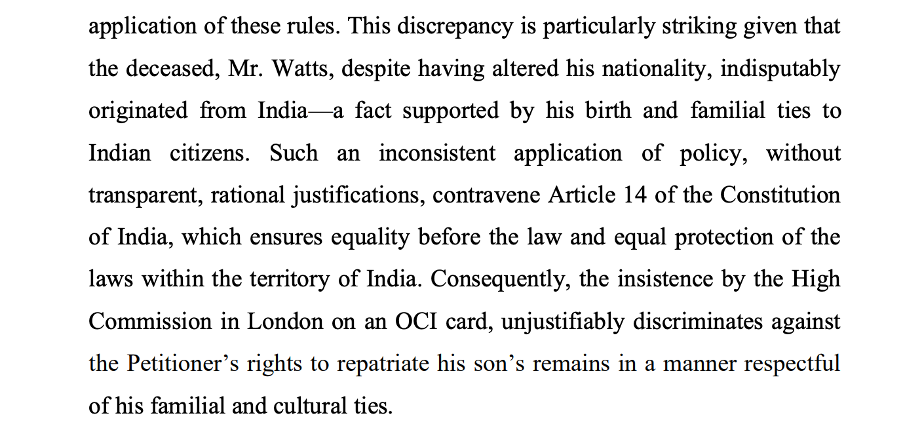
Odisha HC: Voter ID does not serve as the Conclusive proof of Date of Birth
In the case of Tapaswini Panda (Petitioner) vs. Zonal Manager, LIC, Patna, & Ors (Respondents), the Odisha HC held that the Voter Identity (Voter ID) cannot be taken as conclusive proof for the Date of Birth (DoB).
The facts of the case were that the Petitioner is the nominee of her deceased father who made 3 life insurance policies and the bonds to this effect were issued by insurance companies. In all the 3 policies, the DoB of the deceased was registered as 18 March 1952. This DoB was accepted and on the same basis, policies were issued to the deceased. After his demise on 15 March 2012, his daughter-nominee claimed the insurance amount. While the claim of the insured amount of two policies issued by one company was paid to the nominee-petitioner, the third insurance claim from Life Insurance Corporation (LIC) of India was rejected on the reason that the DoB stated in the policy did not match with the DoB given in the Voter ID of the deceased. While the age of the deceased at the time of his death as the per DoB given in the school certificates was 59 years, it is however 67 years as per the stated DoB in the voter ID. Accordingly, the claim was rejected as being a case of suppression of age and facts. The same stance was also taken by the Insurance Ombudsman and the claim was rejected. Hence, the petition against it was filed in the Odisha HC.
The court noted that as a matter of fact, the DoB stated in voter ID does not serve as conclusive proof to validate the DoB of a citizen, as held in numerous verdicts of SC. In the case of insurance, the insurers tend to prefer DoB stated in school certificates or municipal records as authoritative documents and issue the policies based on it. In the present case, the second policy was issued on the basis of the DoB stated in the school certificate of the deceased, while the third policy, which was rejected, took the second policy as the basis of the DoB. Therefore, it is unsafe to place significant reliance on the DoB stated in Voter ID. Accordingly, the court ordered for disbursal of the insurance amount to the petitioner within a week. The court also noted that oftentimes, policyholders suffer from numerous administrative issues, such as those in the present case, for the release of the amount they are entitled to. Accordingly, it made a strong suggestion to the insurance companies to critically evaluate their actions and prioritize working for the benefit of the customers.
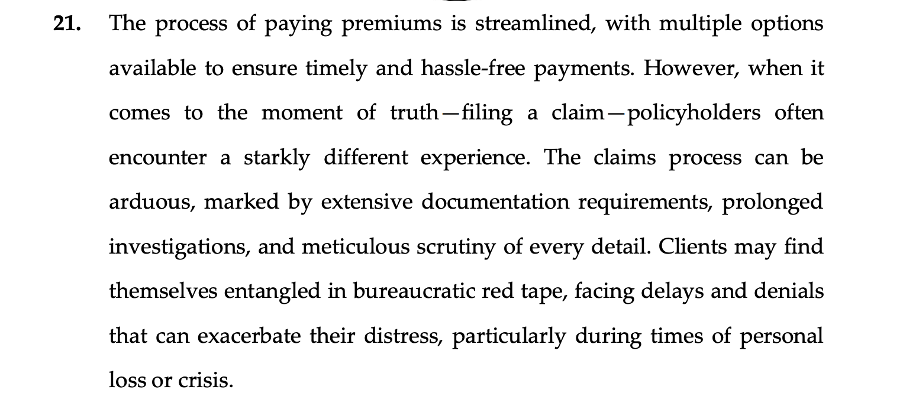
Jammu & Kashmir HC: Children’s Courts are competent to try offences under UAPA
In the case of National Investigation Agency (NIA) (Appellant) vs. Abid Mushtaq Mir (Respondent), the Jammu and Kashmir (J&K) HC held that the courts constituted to try the offences of children are empowered to try the offences under Unlawful Activities (Prevention) Act (UAPA) also.
The facts of the case were that the respondent, who is a child aged 16 years, is alleged to have committed a heinous crime. As a result, the Juvenile Justice Board (JJB) has passed an order to treat the child as an adult and to be prosecuted accordingly by the Sessions Court. The Sessions Court transferred the matter to the special court constituted under the NIA Act, which then transferred the matter to another special court constituted under the Protection of Children from Sexual Offences (POCSO) Act. The NIA, which is trying the offences against the respondent filed an appeal against the transfer order of the NIA court, with the claim that the special courts constituted under the POCSO Act do not have the authority to try UAPA offences.
The HC noted that as per section 2 (20) of the JJ Act, “Children’s Court” means a court established under the Commissions for Protection of Child Rights (PCR) Act or a Special Court under the POCSO Act. In case such courts are not constituted, the Court of Sessions having jurisdiction will try the offences. Further, sections 2 (33) and 2 (54) define heinous and serious offences as including those defined under the Indian Penal Code (IPC) and any other law for the time being in force, which thus includes UAPA. Accordingly, keeping the interest of the child as paramount and the fact that provisions relating to the JJ Act take precedence over the NIA Act, the court held that children’s court constituted under the POCSO Act is competent to try the offence under UAPA also, irrespective of the severity of the punishment. Thus, the appeal of NIA was dismissed.
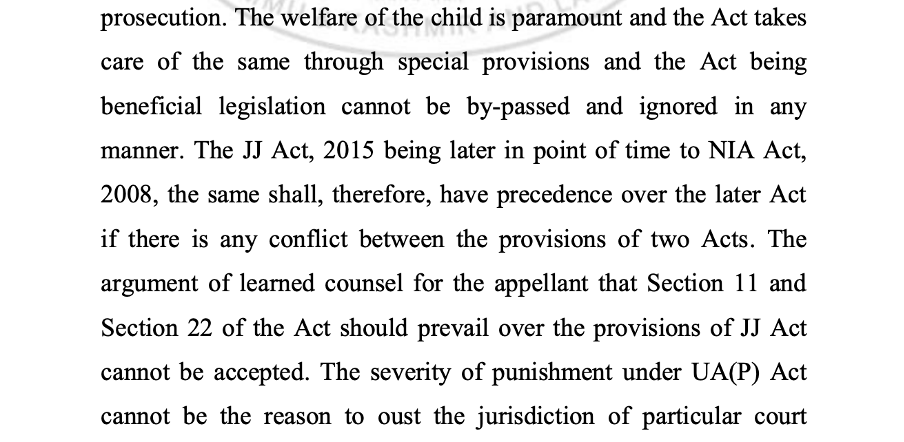
Kerala HC: Dumping Waste on Public Properties is on the rise, the time has come to incorporate stringent provisions
In the case of Suhail M. A.(Petitioner) vs. State of Kerala & Ors (Respondents), the Kerala HC noted that the dumping of waste, especially septic waste, into public properties is on the rise and hence there is a need to incorporate stringent provisions.
The facts of the case were that Petitioner was caught and his vehicle was confiscated by the respondent authorities while dumping septic waste into the water stream, which led to its pollution. The petitioner prayed for the release of his vehicle. The court noted that vide its order in another case, the court restrained the state authorities from releasing the vehicles which are caught dumping waste into public properties. While the objective of the same order was to prevent the dumping of waste, it is only seen that such offences are on the rise. In the instant case, though the confiscated vehicle, as prayed, can be released, the possibility of repeating the same offence through the same vehicle cannot be ruled out. Hence, it necessitates the invocation of stringent conditions. Therefore, the court ruled that the vehicle would be released on furnishing of bonds worth Rs. 1,00,000 and a bank guarantee worth Rs. 2,00,000. Petitioner shall not transfer, sublet, lease or sell the vehicle. However, police are free to repossess the vehicle if the offence is repeated and initiate further measures to enforce the guarantees.
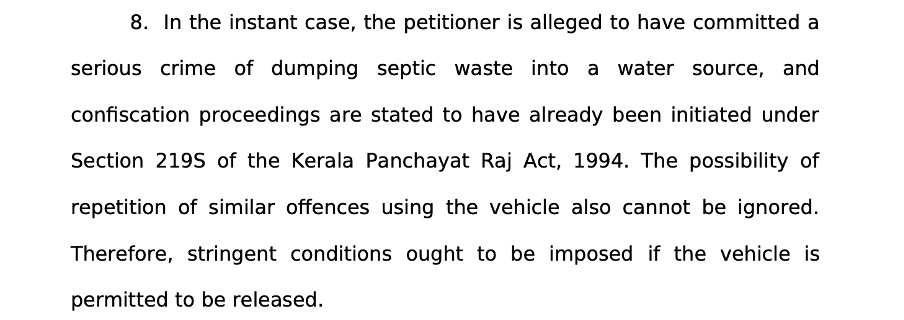
Bombay HC: Grants bail to the Applicant, accused of sexual offence against 7-year-old, on the reason of non-completion of trial
In the case of Dattatray Shrikrushna Shejole (Applicant) vs. The State of Maharashtra (Respondent), the Bombay HC granted bail to the Applicant who is accused of sexually abusing a 7-year-old girl and corroborated by the medical evidence.
The Applicant has been in prison since 15 December 2021 and the trial is yet to be completed. Though the court noted that medical evidence confirms the commission of the offence, it granted bail to the applicant subject to certain conditions, by noting that the Supreme Court (SC) in its recent order in Javed Gulam Nabi Shaikh vs. State of Maharashtra and another held that accused have a right to speedy trial even if the charges laid against accused are serious.
